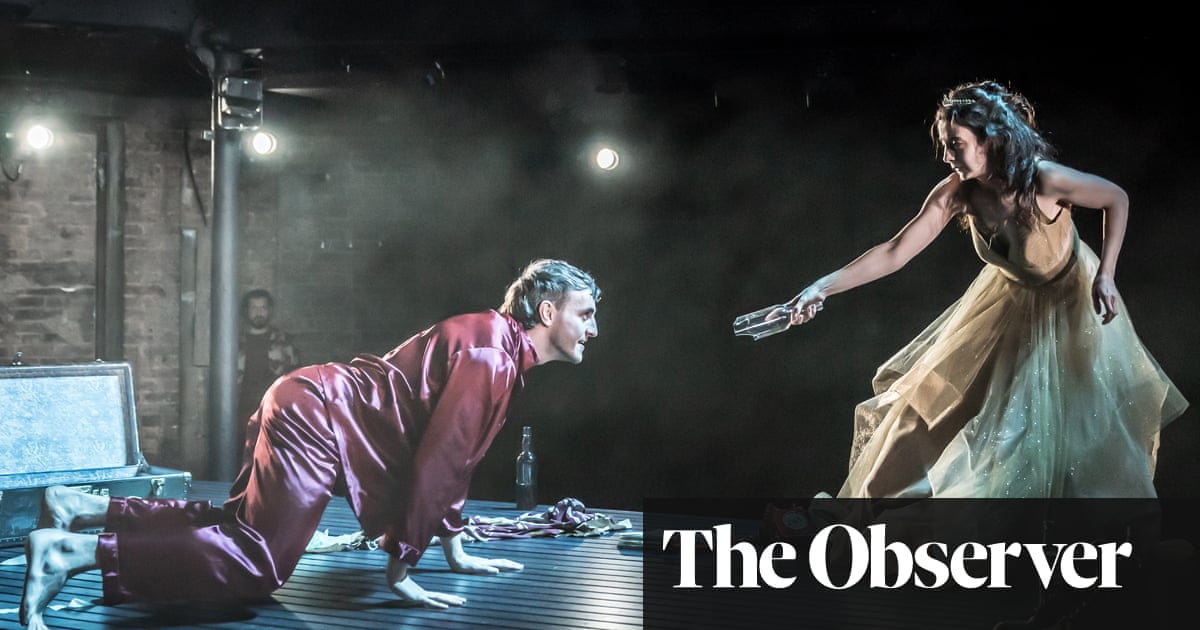
A Streetcar Named Desire is often seen as a play about sexuality but the Young Vic production draws our eye to the sibling bond between Blanche DuBois and her sister, Stella. Was there a focus on the sisters?
I felt like I knew the play inside out until I started working on this production, which peels away the onion layers on all the relationships between its characters. Firstly, there’s something absolutely extraordinary about the complexity of Williams’s drama which has so many layers. Benedict Andrews, who was the most fantastic director for this, got it on a deep, cellular level and created a platform where you could just keep ploughing through and investing in the joy and complexity of it.
Out of that came a whole new level between the sisters – not only the competition and jealousy between them but the guilt, love, shame and a gamut of other emotions. Sex came into both their lives at an early age – what was expected of them, what they were used for and the discovery that their sexuality was their currency. Blanche uses it to the nth degree but it is also Stella’s currency.
Magda Willi’s set is designed on a revolving stage and the drama never stops moving. What was the idea behind this perpetual movement?
The movement starts when Blanche takes her first sip of alcohol on stage to calm her nerves. The minute she takes the sip the stage is moving; she feels it and the audience feels it too. It starts the real action and becomes a merry-go-round that none of them can get off. Even at the end when Blanche is taken away, the stage continues to go round because Stella is still trapped in the system.
Technically, we understood that it would almost be like watching a film through a lens so that the audience could sometimes only hear our words and not see us and at other times be close up as we came closer towards them, which added something powerful to watching it.
What effect did the revolving stage have on your performance?
At the beginning we were all really dizzy until we acclimatised. There are times when Blanche wears six-inch heels and at a certain point I had to see a chiropractor because I stepped off and yanked my hip. And in a New York show, Vanessa Kirby [who plays Stella] got her leg caught in the revolve.
What’s the biggest difference between playing a character on stage and on screen?
When you’re creating a character for TV or film you’re not playing it 24/7. With a play, you are doing it over and over and over again and this play got right into my gut. When I performed it in New York I was either in my Airbnb or on stage for the entire time. Part of that was about holding the character alive but it left me in a vulnerable state. Going into a corner shop to buy milk when you are Blanche DuBois is hard. I felt like all the layers of my skin had come off. You need to immerse yourself in a mental state to make the character truthful on stage and I don’t think I have ever immersed myself so deeply. There were moments when I felt I was hanging on to reality by a thread and I needed to talk to people to ground myself so I wouldn’t disappear into the ether. I’m not sure I would have the stamina to do it again.
Benedict Andrews said something time and again: that the play had elements of danger, addiction, guilt and sorrow which could be imagined like a shark swimming under the water. Every now and again, the shark would come up, expose its fin and be gone again. We wanted the audience to know the shark was there. That collective feeling is part of the experience of theatre and it’s why theatres are so vital. These NT productions online are a way for theatre to stay alive but they are also a reminder that in order for theatres to open again, they will need financial support and any help they can get in donations.
How do you prepare for a role like Blanche DuBois – or your stage role last year as Margo Channing in All About Eve – which have been made so iconic on film?
It’s important not to watch anything remotely connected in the lead-up to a part. You don’t want to go in with preconceptions or any part of your mind relying on something. With both Blanche and Margo, it was important for me to go in with a blank slate. I wanted to start from scratch. You want your own interpretation but also, you don’t know what vision the director will come in.
I watched the film with Vivien Leigh when I was in college and then I made a point of watching it after I had finished playing Blanche. I thought Leigh’s Blanche was very vulnerable, lost and weak, in a way. My Blanche is vulnerable in a different way. She comes with a lot of gusto and oomph.
How tricky were the quick costume changes which take place on stage?
Some days I couldn’t find my shoes. Some days I couldn’t do up the zip on the back of a pink dress that I pick up from the floor [which Blanche puts on in a drunken state]. I would be doing my monologue while holding the zip up with one hand. Halfway through the production we had to make a double of the dress because it was so ratty and had mopped up everything that had been thrown on the floor. It was covered in potatoes and gravy and gunk. In one performance its crinoline got caught in the leg of a chair and I was dragging the chair around with Blanche yelling that somebody was after her and it added to the intensity of the moment. The only way through it is to use it in the scene and keep going.
You have said you’d always wanted to play Blanche DuBois. Is there another character you are burning to play?
I had wanted to play her since I was 16 so she lived inside me for a very long time. I was determined to play her and 30 years later, at the age of 46, I did. She really was the only one. Since doing her, I’ve been trying to find other characters and productions that are as interesting and deep. I’d like to do Lady Macbeth, in the right production.
You filmed a short prequel to Streetcar, entitled The Departure, and mentioned the possibility of a sequel too in 2015. Is that something you are still considering?
I did and it would be interesting but the question is how I would see Blanche after the final scene in the play. We don’t know what happens to her [after she is led away by a doctor and nurse] and I think it’s important that it hangs there. For some people, it might be important to imagine that she finally goes somewhere she feels safe and others might think it’s all downhill from there and she ends up growing old, hearing imaginary voices, in an institution.












